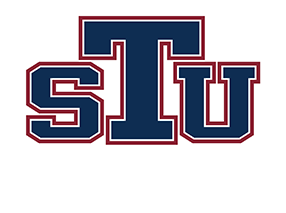
Master of Arts in Theology
Leadership:
Rev. Rafael Capó, D.Min., STL
Vice President for Mission and Ministry,
Dean of the School of Theology & Ministry
Rev. Hilary O. Nwainya, PhD, STL
Assistant Professor/Program Director
hnwainya@stu.edu | 305.628.6515
Vision: The Master of Arts in Theology forms leaders in the New Evangelization through a rich theological and ministerial curriculum. The program aims to provide students with a renewed Christian mind and vision — an intellectual and spiritual formation capable of engaging the postmodern, post-Christian culture.
Mission: To educate men and women with theological expertise and pastoral skills within a community of faith and scholarship for use in service of the Church and society. The mission is modeled in the following ways:
- Courses that ground the student in the Catholic theological tradition and pastoral ministry practice.
- Opportunities for interaction among faculty and students beyond the classroom.
- Online instruction, use of multiple media, and new research technologies.
- Individual advisement as an integral element of students’ educational program.
- A rich multicultural experience provided by a diverse student body and learning opportunities.
- An ecumenical and interfaith appreciation grounded in the Catholic intellectual and artistic tradition.
Admission Requirements
- Online Graduate Application
- A Bachelor’s degree with a cumulative GPA of at least 3.0.
- Current CV (with list of references)
- Two confidential recommendation letters speaking to the applicant’s potential for success in theological graduate studies.
- The first reference should be a priest, deacon, religious, or minister
- The second reference should be a professor, supervisor, or mentor
- A brief personal statement explaining the reason for pursuing the degree (at least 250 words, not to exceed 500 words)
MA IN THEOLOGY COURSE REQUIREMENTS: 36 credits
Theological Foundations: 27 credits
“Theology’s proper task is to understand the meaning of revelation” (Donum Veritatis §10). The theological foundations core provides students the opportunity to explore the depths of revelation — establishing a solid base for considering concrete situations in a ministerial concentration.
- STM 500B MA Theology Orientation: 0 credits
- STM 500 Theological Research and Writing*: 3 credits
- STM 513 Fundamental Theology: 3 credits
- STM 521 Hebrew Scriptures: 3 credits
- STM 522 Christian Scriptures: 3 credits
- STM 531 Christian Thought I: 3 credits
- STM 532 Christian Thought II: 3 credits
- STM 541 Theological Ethics: 3 credits
- STM 732 Christology: 3 credits
- STM 737 Sacramental Theology: 3 credits
*STM 500 must be taken during the first year of study.
Bioethics Specialization: 9 credits
These courses enable the student to acquire a solid foundation in Catholic moral theology while developing the ability to apply relevant ethical principles to concrete bio-medical cases. Students may choose courses according to their needs and course availability. Note: BIO 513 is required of all students completing the Bioethics Specialization.
Required Course
BIO 513 Fundamentals of Catholic Bioethics**: 3 credits
Elective Courses (Choose two):
- BIO 600 Bioethics of Human Population & Earth’s Ecosystem: 3 credits
- BIO 601 Bioethical Decisions in Healthcare Services: 3 credits
- BIO 602 Beginning of Human Life Bioethics: 3 credits
- BIO 603 End of Human Life Bioethics: 3 credits
** Fundamentals of Catholic Bioethics (Required)
As an academic specialization that assists students with the knowledge and skills necessary to engage in critical evaluation of current bioethical issues, the program also requires students to integrate knowledge from the empirical sciences, philosophy and moral theology according to the Catholic tradition. The Fundamentals of Catholic Bioethics course critically analyzes the fundamental Catholic moral principles and biological principles necessary for the proper determinization of what may be done out of what can be done in empirical science, medicine, and technology today.
Evangelization Specialization: 9 credits
These courses enable the student to develop competence in evangelization. Students may choose courses according to their needs and course availability. Note: STM 591 is required of all students completing the Evangelization Specialization.
Required Course
STM 591 Ministerial Capstone**: 3 credits
Elective Courses (Choose two):
- STM 600 Evangelization: 3 credits
- STM 601 Catechetics: 3 credits
- STM 581 Spiritual Practices in/for Ministry: 3 credits
- STM 512 Method in Ministry: 3 credits
** Ministerial Capstone (Required)
As an academic specialization that assists students in the development of theological and ministerial skills, the program requires students to reflect on and implement the knowledge they have developed in specific ministry contexts. The Ministerial Capstone requires students to identify a ministerial site where they will be able to apply this knowledge and skill set. Through the capstone, students demonstrate their competence in integrating principles drawn from coursework to concrete ministerial circumstances in their concentration area.
Program Student Learning Outcomes
- Demonstrate knowledge of four major fields of Christian theology that inform ministry: systematics, scripture, ethics, and practical theology.
- Demonstrate the use of a pastoral theological method.
Program Student Learning Outcomes Assessment: These outcomes are to be demonstrated through the successful completion of 36 credits and the Ministerial Capstone Project with an oral presentation.
Transfer of Credit
In consultation with the program coordinator, up to 12 graduate credits may be accepted from a regionally or ACPE accredited institution. Each course will be evaluated on a course-by-course basis for transfer of credit and its appropriateness to the degree. Please see the Transfer of Credit Statement in the Academic Policy and Regulations section of the Graduate Catalog for further information.
Course Sequence
There is no required course sequence, and no prerequisites are mandatory for any student admitted to the program. Students should consult their advisor as they plan their studies. Foundational courses follow a two-year cycle with two required courses offered each fall and spring. While the School does not in any way guarantee that certain courses will be offered at certain times, the ordinary sequence for the required coursework is based on a two-year rotation.
ADDITIONAL POLICIES
Academic Standing
To remain in good academic standing, a student must maintain a cumulative grade point average of at least 3.0. Students must be continuously enrolled. Students who do not register for a course within one year of acceptance need to reapply for the program.
Leave of Absence and Deferments
Students or candidates who need to interrupt their program of studies, and thereby suspend their active student status while remaining in good standing, must obtain approval from the dean of the School of Theology and Ministry. Such a leave of absence is given for no more than a year in duration, ending at the start of the fall semester, and must be renewed should it be necessary for more than one year.
For More Information
School of Theology and Ministry
theology@stu.edu | (305) 628-6500

